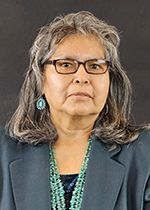
It is with profound sadness that we share the passing of our beloved colleague and dear friend, Francine C. Gachupin, PhD, MPH, on September 23, from an aggressive neuroendocrine cancer. After undergoing numerous treatments and procedures, she returned to her home in New Mexico to spend her final days with her family and friends.
Dr. Gachupin devoted her life to improving the health and well-being of Native American communities, with a particular focus on youth and families at high risk for diabetes. She also worked tirelessly to reduce health care disparities, especially in cancer prevention.
Dr. Gachupin's academic accomplishments were extensive, beginning with a Bachelor of Arts degree in psychology and criminal justice from the University of New Mexico. As a Sloan Fellow at the LBJ School of Public Affairs at the University of Texas, Austin, she expanded her knowledge and leadership skills. She went on to earn a Master of Arts in anthropology from the University of New Mexico, followed by a Master of Public Health in epidemiology from the University of Washington. Her master's thesis, titled "Hospitalization among American Indians Dying of Heart Disease," marked the start of her focus on health disparities. She continued on and earned her PhD in anthropology from the University of New Mexico, solidifying her path as a dedicated researcher.
Dr. Gachupin joined our department in 2012 as an assistant professor. She was promoted to professor in 2023. She had joint appointments in the Department of Psychology, College of Social and Behavioral Science, American Indian Studies, the Mel and Enid Zuckerman College of Public Health, and the College of Social and Behavioral Sciences American Indian Studies Graduate Inter-Disciplinary Program.
Throughout her career, Dr. Gachupin mentored and supported numerous graduate students and research associates.
Dr. Gachupin is perhaps best known for her American Indian Youth Wellness Camp. This was a camp that was established for America Indian youth at high risk for diabetes. When the COVID-19 pandemic made in-person gatherings impossible, Dr. Gachupin adapted the program into a "Camp in a Box" model, ensuring that youth and their families could still participate and benefit remotely.
She is also well known for her work in Native American cancer prevention and health disparities, and worked with the Partnership for Native American Cancer Prevention (NACP) — a collaboration between Northern Arizona University and the University of Arizona Cancer Center. Through her work with NACP, Dr. Gachupin was focused on alleviating the unequal burden of cancer among Native Americans of the Southwest through research, training, and community outreach.
Dr. Gachupin was also passionately committed to safe and respectful tribal research. Her training series, "Community-Based Tribal Research: Doing Environmental Research in Tribal Communities” was presented numerous times across the country.
She served on numerous local and national boards and committees, too many to name. Last year, she was honored with an invitation to deliver the keynote address for the National Institutes of Health's "Summer Internship on Health Disparities in Tribal Communities."
As a researcher, Dr. Gachupin was ranked #10 on the NIH Blue Ridge Rankings. This is a very prestigious honor and recognition. Before her passing, she was awarded an NIH grant, “A School Based Partnership with Rural Tribal Schools for Primary Prevention of Obesity Among American Indian Youth," that will go until 2029. As part of a collaborative effort, she also received a National Cancer Institute grant, "Partnership for Native American Cancer Prevention," that will also continue until 2029.
Dr. Gachupin's life and unwavering dedication to her work—through impactful research, community outreach, mentoring, and leadership—has established a lasting legacy that will continue to thrive in Family and Community Medicine, through the University of Arizona Cancer Center, and within our community.



